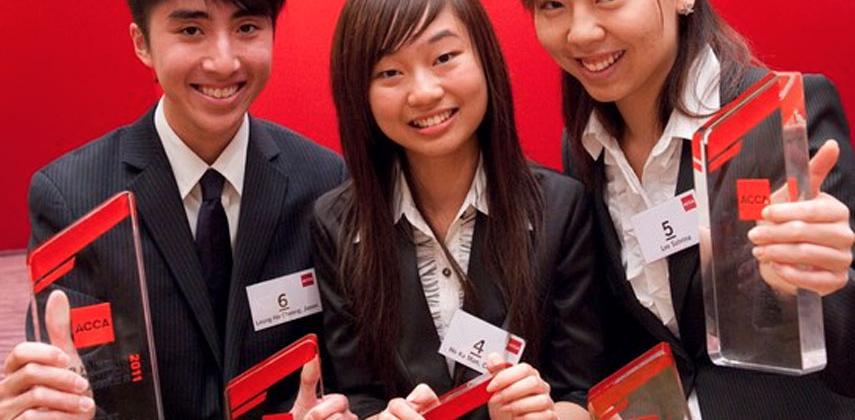The 12 finalists were randomly grouped into three management consulting teams. They were given two hours to develop a proposal that would turn around the business of an international firm, and prepare a 20-minute presentation. Afterwards, each team answered questions from judges who assumed the role of the prospective client. The teams also questioned each other.
Carman Ho Ka-man, a second year bachelor of global business studies (BGBS) student at the Chinese University (CUHK), was named the winner. First runner-up was Jason Leung Ho-cheong, a first year BGBS student at CUHK and second runner-up was Sabrina Lee, a second year bachelor of law student at CUHK.
Group 2 was voted Best Team by the audience. Team members were Lee, Leung, Oscar Pang Ka-chun, a first year BGBS student at CUHK who was third runner-up, and Eva Ting Yi-fan, a second year bachelor of professional accounting student at the Hong Kong University of Science and Technology.
The Association of Chartered Certified Accountants (ACCA) was the competition organiser. Top executives of multinational corporations were the judges. The companies were Deloitte Touche Tohmatsu, Ernst & Young, Fortune International Group, Kingdee International Software Group (HK), KPMG, and PwC. Chairwoman of ACCA Hong Kong, Rosanna Choi, was also on the judging panel.
While all finalists demonstrated excellent communication and presentation skills, Ho stood out because she took charge of the morning preparation from the beginning, says Paul McSheaffrey, an audit partner at KPMG. "She volunteered to organise the discussion and set a time limit for each part of the presentation. All the way through, Carman contributed her ideas. She did not dominate the discussions, but listened to others' opinions attentively."
Josephine Cai, a senior manager at Fortune International Group, agrees.
"Ho contributed a lot of ideas during the morning preparation session. She gave a lot of examples to support her stand."
Choi says Group 2 shared the workload and worked together to develop the presentation in winning the team award.
Judy Wong, a partner in assurance and advisory business services at Ernst & Young, says judges were impressed with the proposals developed by all teams. "The topic is tough considering the finalists' [lack of] job experience. They excelled at developing innovative yet pragmatic solutions."
The finalists demonstrated great ability to work under pressure, Choi says. "They were only given two hours to provide practical solutions and prepare the presentation. Because they were randomly grouped into teams, many did not even know each other before the competition started. It is amazing to see how the finalists co-operated with one another to arrive at the solutions."
Regarding areas to be improved, Anthony Tam, a tax partner at Deloitte, says the contestants should maintain eye contact with the judges to get their attention.
A partner in assurance at PwC, Imma Ling, says finalists should not have apologised when they could not provide an answer to a specific question. "They should handle it more tactfully. Perhaps they can say, `point taken, but due to time constraints I would like to have a second interview with you to elaborate on this point'."
The competition is an annual region-wide event held in Hong Kong, Beijing, Shanghai, Guangzhou and Chengdu. This year's competition attracted more than 5,000 applicants. It enjoys support from leading multinationals firms and many offer internship opportunities for semi-finalists and top scorers.
The top three scorers will compete against other regional winners at the grand final in Guangzhou on June 3.
Team spirit takes prize
The top three scorers of the ACCA Hong Kong Job Hunting Competition 2011 appreciated the teamwork they had established as they prepared for their business solution presentations.
The winner, Carman Ho Ka-man, says all members of her team contributed a lot of good ideas during the preparatory phase. "To ensure the integrity of the final solutions, the team carefully evaluated every possible solution. I really enjoyed the process."
Sabrina Lee says her team established good rapport early on. "The team spirit was good. I monitored the progress of every idea and each of us took turns in leading the discussion." Lee is the second runner-up.
Jason Leung Ho-cheong, the first runner-up, says he enjoyed working with his team members. "At the beginning of the morning session, we assigned to one another specific parts of the presentation. After completing our individual parts, we practised the presentation and went through all slides together to get the full picture."
Lee entered the competition because of the opportunity to acquire and practise important skills for her career. "This is a great opportunity to network with students from other universities to broaden our horizon. The top scorers will enter the Grand Final in Guangzhou and we will have the opportunity to network with university students from other parts of China as well."
Because the competition closely resembles real-life recruitment processes, it helps the contestants identify which areas they need to improve on when they look for a job, Leung says. "The judges provide very useful suggestions for improvement."


